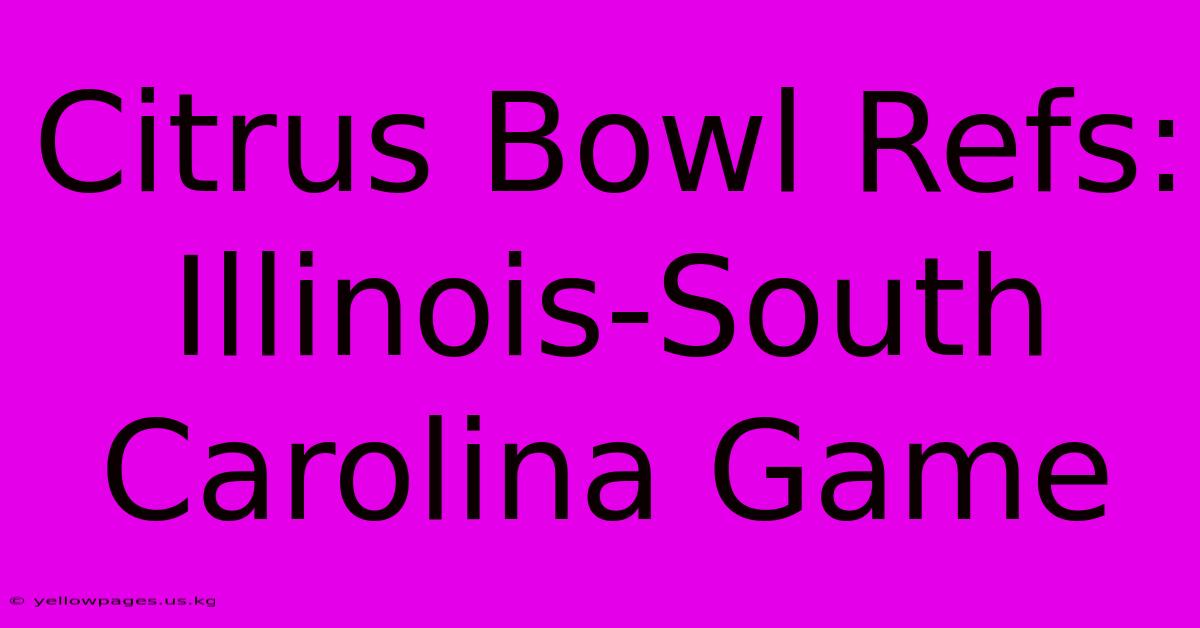Citrus Bowl Refs: Illinois-South Carolina Game

Discover more detailed and exciting information on our website. Click the link below to start your adventure: Visit Best Website trendingnews.us.kg. Don't miss out!
Table of Contents
Citrus Bowl Refs: Controversy and Calls in the Illinois-South Carolina Game
The 2023 Citrus Bowl between the Illinois Fighting Illini and the South Carolina Gamecocks was a hard-fought contest, but unfortunately, it was also marred by several controversial officiating calls that left fans and analysts debating the impact on the game's outcome. This article delves into the key refereeing decisions that sparked the most discussion, examining the calls themselves and their potential consequences.
The Most Contentious Calls: A Breakdown
Several calls, particularly in the second half, ignited significant controversy. These included:
1. The Targeting Penalty on Illinois
A crucial targeting penalty called against an Illinois defender sparked intense debate. The replay showed a borderline hit, leaving many questioning whether the call was overly harsh and potentially game-changing. The severity of the penalty, resulting in an ejection and significant yardage, impacted Illinois's defensive strategy and momentum. Analysts and fans alike argued about the consistency of applying the targeting rule, noting other potentially similar hits that weren't flagged. This highlights the subjective nature of judging player intent and the difficulty in ensuring consistent officiating across games. This call played a significant role in shifting the game's momentum.
2. The Pass Interference Non-Call
Another contentious moment came down to a possible pass interference call. Replays appeared to show potential interference by a South Carolina defender, hindering Illinois's receiver. The lack of a flag in this instance fueled criticism of the officiating crew's consistency. Many argued that a call in this situation would have resulted in a significant change in field position for Illinois, potentially altering the final score. The inconsistency in calling pass interference throughout the game only amplified the controversy. The absence of a clear explanation from the officiating crew further frustrated fans and commentators.
3. The Holding Calls (or Lack Thereof)
The perceived inconsistency in calling holding penalties on both sides of the ball also added to the post-game analysis. Many argued that certain instances of potential holding went uncalled, raising questions about the referee's criteria for applying the rule. This discrepancy, combined with other contentious calls, led to accusations of biased officiating. Fairness and consistency in calling holding are essential for a fair game, and the perceived lack of this consistency significantly impacted the overall perception of the refereeing.
The Impact of Officiating on the Game's Outcome
While impossible to definitively say whether the controversial calls directly decided the game, there's no doubt they significantly impacted the flow and momentum. The targeting call particularly swung the game in South Carolina's favor, while missed or questionable calls could have easily altered Illinois's offensive drives. The cumulative effect of these calls created a sense of injustice among Illinois fans and contributed to the post-game debate.
Beyond the Calls: Broader Implications
The Citrus Bowl officiating controversy underscores a broader issue in college football: the need for greater transparency and consistency in officiating. Improving replay review processes, implementing more standardized guidelines for officiating calls, and providing clear explanations to coaches and the public are crucial steps to improving fan trust and ensuring fair play. The ongoing discussion about these calls is a reminder that consistent and impartial officiating is critical for maintaining the integrity of the sport.
Conclusion: The Need for Improvement
The 2023 Citrus Bowl's officiating generated significant controversy, focusing attention on the need for improvements in the consistency and transparency of officiating in college football. The impact of the questionable calls on the game's outcome will likely continue to be debated, emphasizing the need for continuous refinement of officiating standards and procedures to ensure fair play and enhance the overall fan experience. The discussions following this game serve as a valuable opportunity for reflection and reform within college football officiating.

Thank you for visiting our website wich cover about Citrus Bowl Refs: Illinois-South Carolina Game. We hope the information provided has been useful to you. Feel free to contact us if you have any questions or need further assistance. See you next time and dont miss to bookmark.
Featured Posts
-
Sun Bowl Score Louisville Vs Washington
Jan 01, 2025
-
Citrus Bowl Refs Illinois South Carolina Game
Jan 01, 2025
-
Aaron Brown 76 Passes Away
Jan 01, 2025
-
2025 Nhl Winter Classic New Years Eve Date Explained
Jan 01, 2025
-
Widespread Outage Affects Puerto Rico
Jan 01, 2025
